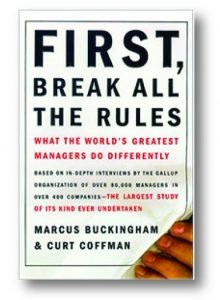 After examining the answers from one million employees and eighty thousand managers, the authors of this book distilled out some fascinating and important information from 25 years’ worth of research gathered by the world renowned Gallup Organization.
After examining the answers from one million employees and eighty thousand managers, the authors of this book distilled out some fascinating and important information from 25 years’ worth of research gathered by the world renowned Gallup Organization.
The most important information was that great managers think and behave very differently from what conventional wisdom would predict. And great managers are the crucial difference between consistent, excellent business measures and simply average ones. Great managers “Break All The Rules” because they believe that not everyone can do everything, that it is a waste of time to work on weaknesses, that it is a mistake to treat people as you would like to be treated, and that it is important to spend most of your time with your best people.
Great managers have employees who answer “definitely yes” to most of the following 12 questions:
1. Do I know what is expected of me at work?
2. Do I have the materials and equipment I need to do my work right?
3. At work, do I have the opportunity to do what I do best every day?
4. In the last seven days, have I received recognition or praise for doing good work?
5. Does my supervisor, or someone at work, seem to care about me as a person?
6. Is there someone at work who encourages my development?
7. At work, do my opinions seem to count?
8. Does the mission/purpose of my company make me feel my job is important?
9. Are my co-workers committed to doing quality work?
10. Do I have a best friend at work?
11. In the last six months, has someone at work talked to me about my progress?
12. This last year, have I had opportunities at work to learn and grow?
Over the many years that Gallup gathered their data, they consistently asked their clients to identify their best managers – the ones they would dearly love to clone. They also used performance scores like those measuring productivity, profit, absenteeism, employee accidents, and customer feedback.
They found that the great managers they identified differed in many ways, but those managers consistently said:
People don’t change that much.
Don’t waste time trying to put in what was left out.
Try to draw out what was left in.
That is hard enough.
To clarify what they meant by talent, Buckingham and Coffman referred to the latest understanding from research in brain development.
We are all born with billions of brain neurons, which over the first few years of life form connections with each other. By the time someone is about 13 years old, some connections are smooth and swift like “a four lane highway”, while others are bumpy and slow. Due to both nature and nurture, we are all attracted to certain patterns of thought, feelings, and behaviour. Those “roads” in our brain that have the most traffic get widened, while the ones that are rarely used fall into disrepair.
Talents are unique and enduring. They are part of one’s mental filter on the world. Knowledge can be acquired, skills can be practiced, but talents are part of who you are and are extraordinarily difficult to teach.
Great managers are good at figuring out what talents are needed for a particular role, selecting the right person, and making their expectations of that person very clear. They focus on the employee’s strengths, give frequent feedback and constantly challenge the employee to grow stronger and more expert in his or her role.
“First Break All The Rules” is well worth reading if you want to be a great manager, or hire a great manager.
by Marcus Buckingham and Curt Coffman

